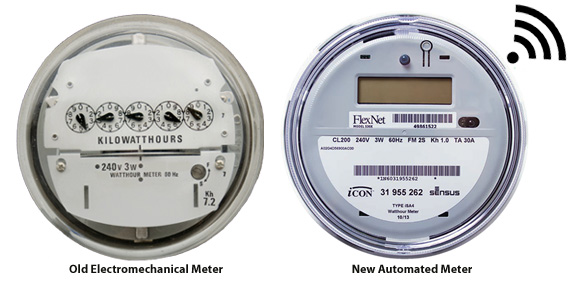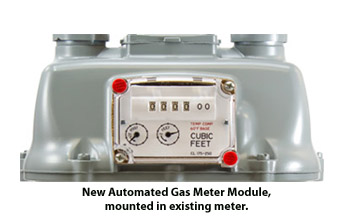Automated Meters: Enabling You to Access Your Energy Information Anytime, Anywhere!
Midwest Energy replaced all electric and natural gas meters with automated meters, concluding in 2019. Today, customers have access to their detailed energy usage through the CustomerConnect portal, accessible when you log into your MidwestEnergy account.

What are automated meters?
Automated meters look similar to your current electric or gas meter, and they measure electric or gas usage the same way your current meter does. But they're "automated" in that they contain a small radio transmitter that sends your usage information back to our offices every four hours. Automated electric meters also provide data on voltage, as well as any disruptions that occur on the power lines. Midwest Energy will deploy automated meters for all electric and natural gas meters now in service.

Automated meters help control operating costs, improve reliability, speed outage response, enable new and convenient payment options, increase energy efficiency opportunities and improve employee safety.
Installation began in Hays in 2016, and concluded in the Great Bend District in the summer of 2019.
Why DID we change meters?
To give you improved access to your energy information. Your new meter gives you much more detailed information on your energy usage. Customers can log in to their Midwest Energy account and see their energy use for the past day, week, or month. No more surprises when the bill comes; you can even set up text or e-mail alerts, notifying you when your usage reaches a chosen level, enabling you to budget more effectively and use energy more efficiently.
New technology means improved reliability and new services. Your automated meter sends us consumption information, measured in hourly increments, once every four hours. Automated electric meters send additional information, such as readings on voltage. During an outage, it sends us a signal when it loses power, so we can identify outage boundaries qucikly and restore power soner. In time, you will also have the option to pre-pay for electricity. Pre-paying for electricity whenever it’s convenient for you makes budgeting simple, and eliminates the need for new customers to make security deposits.
Automation helps control costs. Automated meters help Midwest Energy control costs, keeping rates affordable. These meters have helped us save our customers more than $1 million per year through improved utility operations. Most of the savings are related to meter reading and “meter operations” activities (re-reading meters, electric disconnection/reconnections, etc.).
Automation brings safety, convenience and environmental benefits. Meter readers drove thousands of miles each month, and their work exposed them to animal bites, insect stings and other hazards. Automated meters allows us to perform remotely routine functions like monthly meter reading, readings to start or stop service, and some disconnections/re-connections. Remote meters helped take a dozen meter trucks off the road, eliminated thousands of trips each year and reduces the amount of CO2 being released into the atmosphere.
Questions and Answers:
Q: How do "automated meters" work?
A: Automated meters measure both measure total consumption, just as the old electromechanical meters did, but also additional information on voltage and disruptions on power lines, measured in 15-minute increments. Our automated electric meters and natural gas modules have a 2-watt transmitter, allowing them to send encrypted digital readings back to Midwest Energy once every four hours, through a network of more than 50 radio towers. These transmissions take just a fraction of a second. These offer us more accurate readings in a more timely fashion, and allow you to go online and see your current energy consumption anytime you wish.
Q: Are automated meters safe and secure?
A: More than 70 million automated meters have been installed nationwide, measuring electric, natural gas and water consumption. Dozens more companies and cities, like Midwest Energy, install more each year. Midwest Energy is installing Sensus iConA Gen4 electric meters on residential properties, which are the first automated meters to pass Underwriters Laboratory (UL) standards. Residential meters transmit data back to Midwest Energy once every four hours.
Our Sensus meters are "point to point," meaning that the communicate directly with nearby radio towers on a dedicated frequency, unlike "mesh" technologies where meters send data back and forth with nearby meters.
Automated meters give off the same kinds of radiofrequency (RF) waves as cell phones and Wi-Fi devices. Our meters use a 2-watt transmitter that operates in the 900MHz range. For perspective, many cell phones and garage door openers use 1- to 2-watt transmitters, and many CB radios utilize 4-watt transmitters. Given their small transmitters, and because the "duty cycle" of these meters is just a few seconds, six times a day, exposure to RF is significantly less than that of a typical cell phone, or a Wi-Fi router that continuously transmits a signal. The Federal Communications Commission (FCC) regulates RF emissions, and the meters Midwest Energy is installing fall well below the FCC's Power Density Exposure Limit.
The American Cancer Society has reviewed several studies regarding automated meters, and concluded, "Because the amount of RF radiation you could be exposed to from a smart meter is much less than what you could be exposed to from a cell phone, it is very unlikely that living in a house with a smart meter increases risk of cancer.”
From: American Cancer Society, https://www.cancer.org/cancer/cancer-causes/radiation-exposure/smart-meters.html, accessed Sept. 5, 2019.
Q: How can I access CustomerConnect, and what information will I find there?
A: CustomerConnect is accessible to all Midwest Energy customers, once you log into your Midwest Energy account. This brochure explains how to create a new Midwest Energy account, how to access CustomerConnect, and what you'll see once there.
Q: Can customers “opt out” and request an old analog meter?
A: Midwest Energy does not have an “opt out” policy. To receive full benefits of automated meters, Midwest Energy must install them on all premises where we have meters.
Q: Where can I learn more?
A: Customers with questions or concerns on automated meters can call us at 1-800-222-3121.
This page last updated July 13, 2023